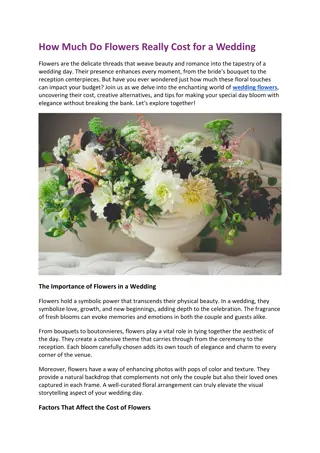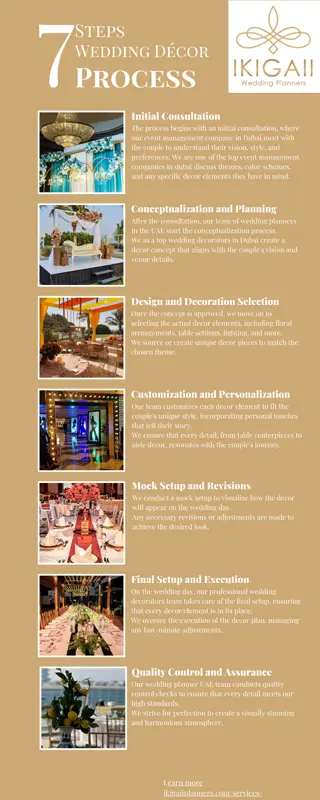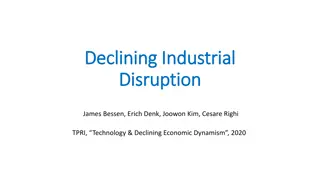Wedding Industry Trends Amidst COVID-19 Disruption
Amid the ongoing pandemic, the wedding industry faces significant disruptions with couples postponing, rescheduling, or canceling weddings. This leads to a forecasted decrease in 2020 weddings but an increase in 2021. Couples are adjusting by reducing budgets, opting for smaller ceremonies, and pivoting to digital events. Wedding businesses are refocusing on service and maintaining contact with clients, while bachelor/bachelorette parties are being limited. Adaptation and flexibility are key in navigating these unprecedented challenges.
Download Presentation

Please find below an Image/Link to download the presentation.
The content on the website is provided AS IS for your information and personal use only. It may not be sold, licensed, or shared on other websites without obtaining consent from the author. Download presentation by click this link. If you encounter any issues during the download, it is possible that the publisher has removed the file from their server.
E N D
Presentation Transcript
Disruption of an Important Life Event According to The Wedding Report s March and June 2020 surveys of couples planning weddings, 21% are or have postponed their weddings until late 2020, 41.5% have rescheduled their weddings to 2021 and 7% have cancelled their weddings. All this disruption and major changes resulted in The Wedding Report forecasting a 47.9% decrease of the total number of 2020 weddings, or 1.11 million, compared to 2.13 million during 2019; however, the projected total for 2021 is 2.77 million weddings. Although The Wedding Report surveys found 30.5% of couples were trying to maintain their 2020 wedding date, the persistence of the pandemic may be a challenge, especially as some media reports of even small weddings have led to the spread of COVID-19 and infections.
Adjusting and Adapting Because 46% of couples responding to the two The Wedding Report surveys said they planned to reduce their wedding budgets by an average of 31%, wedding vendors will suffer and 58% told The Wedding Report they expected to lose more 2020 weddings. Even the 30.5% of couples trying to maintain their 2020 wedding date may find it necessary to opt for a mini- wedding (limit of 50 guests, which is still problematic), a micro-wedding (20 or fewer guests) or a minimony (an elopement, limited guests, ceremony only). Many couples have had to reschedule their 2020 weddings to another 2020 date, but many of the traditional days (Saturday) will be booked. Another option many couples are choosing is a weekday wedding, especially during the evening, so guest will be able to attend.
Pivoting to a Digital/Virtual Event Although most wedding couples are young and, therefore, very digitally savvy, it s difficult to move the entire process online. For example, anecdotal reports from bridal dress shops indicate brides are hesitant to buy a dress online, but they can certainly shop. David s Bridal reported during mid-summer 2020 a 25% YOY increase in Website traffic and the rapid addition of various online resources, such as a vision board, an interactive wedding checklist and a customizable Website. With traveling and staying at hotels/resorts problematic, many couples have and will have to schedule a virtual engagement party and/or an outdoor bridal shower and wedding ceremony/reception.
Wedding Businesses Refocus on Service Wedding vendors/services reported in the May 2020 WeddingPro survey 15% of their weddings had been cancelled, 59% had been rescheduled and 25% were unchanged. These vendors/services are proving they understand the challenges couples are facing, which is why the survey also found 68% of the businesses were holding paid deposits until the date of rescheduled weddings, although 10% required an additional fee or deposit. Unsurprisingly, vendors/services are maintaining contact with prospects, and 85% said they had during the past month (April 2020). Wedding planners were first (46%) among the vendor categories to have had a video chat with a prospect, with officiants second at 36%.
Limiting Bachelor/Bachelorette Parties Much like a wedding ceremony/reception, bachelor/bachelorette parties must also adjust; however, 73% of couples with weddings scheduled during May September 2020 and responding to a WeddingWire survey said they still expect some kind of prenuptial parties. Of the survey participants, 27% were canceling their bachelor/bachelorette parties, 24% were maintaining the schedule and 2% planning a virtual event. To ensure guests safety, 44% were adjusting party activities, 33% the number of guests and 32% location. Most couples weren t changing all of their 2020 bachelor/bachelorette party plans compared to 2019, as 93% still planned to celebrate in the US (92% 2019), a 1 3 day party (86%, same as 2019) and airplane travel (26% vs. 20% 2019).
Youngest Adults Create New Wedding Traditions According to The Knot s Future of Relationships and Weddings Study (spring 2020 survey), approximately half of Gen Zers and youngest Millennials (18 29) consider financial security and developing their careers as priorities before they are prepared to marry. The responses of these young adults to the survey reveal they are both traditional and non-traditional, as their parents (48%) and grandparents (43%) are more likely to influence their relationships and marriage choices than friends (36%). Conversely, 49% of survey participants anticipate more mixed-gender wedding parties, 42% think more brides will forego the traditional wedding dress for other types of attire and 31% are of the opinion fewer spouses will change their last names.
Advertising Strategies With 2021 weddings expected to increase significantly, the many small businesses (dress shops, florists, confectioners, etc.) relying on weddings have opportunities to offer special packages and to attract business from couples who may have to opt for weekday weddings. As 2020 postponed weddings are rescheduled for 2021, various retailers may be able to promote discounted products for their new households, framed as a wedding gift from the store. These include furniture and home furnishings, appliances, etc. Because parents and grandparents influence couples weddings, TV and other traditional media can be used effectively to reach these older family members with products and services they may share and recommend to their children and grandchildren.
New Media Strategies A strong social media presence is important during winter 2020/2021 as many couples will still have to shop for most wedding merchandise virtually. Businesses can schedule Webinars to present new products and services and generate excitement for 2021. Use social media to poll engaged couples about how they are planning their 2021 weddings, the adjustments they are making based on the possible vaccination schedule, which may push more postponed weddings to the second half of the year. Social media and the mobile channel is where to engage with the youngest couples, many of whom are opting for non-traditional weddings, providing suppliers with opportunities to feature more dress, cake, floral, music and other options.























